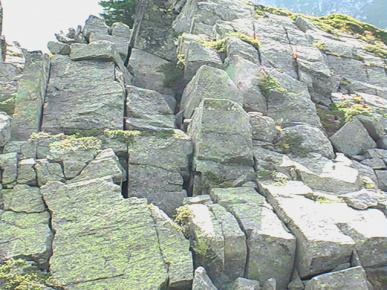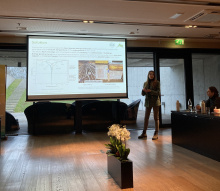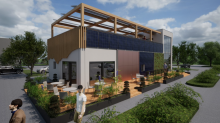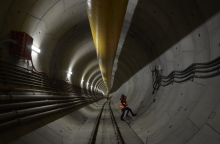This is the web page of the Rock Mechanics and Rock Engineering research group at the Politecnico di Torino.
RockmechPolito |
|
|
|
RockmechPolito |
|
|
www.iacmag2022.org |

NEWS
Maria Romana Alvi finalist at the Young Academics Award 2024
 On January 21, 2025 Maria Romana Alvi attended the Finalists Workshop for the Young Academics Award 2024, held in Brdo pri Kranju, Slovenia.This edition of the Alpine Convention's Young Academics Award focused on “Responding to Environmental Changes and Maintaining a High Quality of Life in the Alps” and Maria's master's thesis "Thermal Performance Assessment of an Energy Lining in the Turin-Lyon Base Tunnel", with supervisors Marco Barla and Alessandra Insana, was selected as one of the noteworthy contributions for sustainable development in the Alps.The research highlighted how thermal activation in hot tunnels, such as those in the Alpine region, could harness heat from the surrounding environment. This process has the potential to generate clean energy to meet the thermal needs of local Alpine communities while also reducing the ventilation requirements of the tunnel.
On January 21, 2025 Maria Romana Alvi attended the Finalists Workshop for the Young Academics Award 2024, held in Brdo pri Kranju, Slovenia.This edition of the Alpine Convention's Young Academics Award focused on “Responding to Environmental Changes and Maintaining a High Quality of Life in the Alps” and Maria's master's thesis "Thermal Performance Assessment of an Energy Lining in the Turin-Lyon Base Tunnel", with supervisors Marco Barla and Alessandra Insana, was selected as one of the noteworthy contributions for sustainable development in the Alps.The research highlighted how thermal activation in hot tunnels, such as those in the Alpine region, could harness heat from the surrounding environment. This process has the potential to generate clean energy to meet the thermal needs of local Alpine communities while also reducing the ventilation requirements of the tunnel.
A significant milestone for the Italian Demonstrator of the ARV European project
 The first innovative technology in the new building under construction in the Ex-Zuffo parking lot of Trento has been installed by the Rockmech Team within the H2020 ARV project. This cutting-edge technology is based on the thermal activation of the foundation slab and walls (Geothermskin).
The first innovative technology in the new building under construction in the Ex-Zuffo parking lot of Trento has been installed by the Rockmech Team within the H2020 ARV project. This cutting-edge technology is based on the thermal activation of the foundation slab and walls (Geothermskin).
Al via il progetto internazionale REGENERATE
 Il progetto coinvolge 17 partner accademici e tecnici da tutta Europa e punta a rigenerare il patrimonio sotterraneo esistente per produrre e stoccare energia
Il progetto coinvolge 17 partner accademici e tecnici da tutta Europa e punta a rigenerare il patrimonio sotterraneo esistente per produrre e stoccare energia



